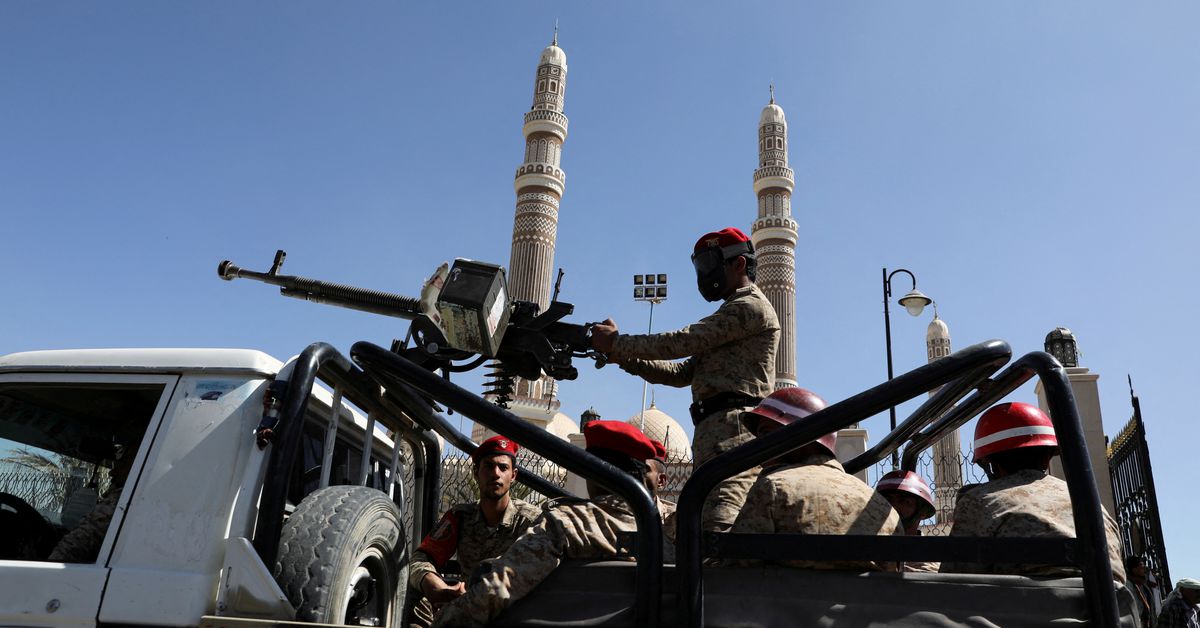Yemen’s slide into political crisis and war

Military policemen ride on the back of a patrol truck at the site of a funeral of Houthi fighters killed during recent fighting against government forces, in Sanaa, Yemen December 6, 2021. REUTERS/Khaled Abdullah
DUBAI, April 1 (Reuters) – Following is a timeline of Yemen’s slide into conflict. The warring parties agreed a two-month truce on Friday in the first major breakthrough in years. read more
* 1990. Unification of north and south Yemen to form a single state under President Ali Abdullah Saleh.
* 1994. Civil war in which Saleh prevents south, angered by what it sees as its lower status, from splitting with north.
Register now for FREE unlimited access to Reuters.com Register
* 2003-09. Houthi group in north protests marginalisation of the local Zaydi Shi’ite Muslim sect and fights six wars with Saleh’s forces and one with Saudi Arabia.
* 2011. Arab Spring protests undermine Saleh’s rule, lead to splits in the army and allow al Qaeda in the Arabian Peninsula (AQAP) to seize territory in the east.
* 2012. Saleh steps down in a political transition plan backed by Gulf states. Abd-Rabbu Mansour Hadi becomes interim president and oversees a national dialogue to draft a more inclusive, federal constitution.
* 2013-2014. AQAP stages attacks across Yemen. Saleh and his allies undermine the political transition. The Houthis seize Sanaa in September 2014 with help from Saleh and demand a share in power.
* 2015. Hadi tries to announce a new federal constitution opposed by the Iran-aligned Houthis and Saleh, who arrest him. He escapes, pursued by the Houthis, triggering Saudi intervention in March at the head of a military coalition.
The coalition drives the Houthis and Saleh loyalists from Aden in south Yemen and Marib, northeast of Sanaa. Frontlines solidify, setting up years of stalemate.
* 2016. AQAP establishes a mini-state around Mukalla. The UAE backs local forces in a battle that ends the group’s rule there.
Hunger grows as the coalition imposes a partial blockade on Yemen, accusing Iran of smuggling missiles to the Houthis, something it denies.
Coalition air strikes that kill civilians prompt warnings from rights groups but Western support for the military campaign continues.
* 2017. The Houthis fire a growing number of missiles deep into Saudi Arabia. Seeing a chance to regain power for his family, Saleh switches sides, but is killed trying to escape the Houthis.
* 2018. Coalition-backed forces advance up the Red Sea coast against the Houthis, aiming to take Hodeidah port, which handles the bulk of Yemen’s commercial and aid imports.
Military stalemate ensues. Peace talks are held in Sweden, the first in two years, and the warring sides agree a truce and troop withdrawal from Hodeidah. Work on a prisoner swap begins.
*2019. The Hodeidah truce largely holds but the withdrawal fails to materialise. Violence continues elsewhere.
The UAE largely ends its presence while still supporting local allies, including southern separatists who in August seize Aden. Riyadh brokers a power-sharing deal between separatists and Hadi’s government but implementation only begins in 2020.
*2020. Coalition announces a truce prompted by COVID-19 but no progress is made to forge a permanent ceasefire and violence continues, though the warring sides carry out a prisoner swap.
An attack on Aden airport moments after a plane lands carrying the newly formed power-sharing government kills at least 22 people. Riyadh and Hadi’s government blame the Houthis.
* 2021: U.S. President Joe Biden revokes a terrorist designation of the Houthis and ends U.S. support for offensive coalition operations.
The Houthis intensify an offensive to seize gas-rich Marib, the government’s last stronghold in North Yemen.
U.N. and U.S. envoys try to engineer a permanent truce and reopening of air and sea links to Houthi areas but the warring sides resist compromise.
Saudi Arabia and Iran launch direct talks, mostly focused on Yemen.
*2022. Houthis extend missile and drone strikes to the UAE after Emirati-backed local militias battle the group in energy-producing Shabwa and Marib. Coalition warplanes pummel Yemen.
The United States moves to boost defence capabilities of Gulf allies amid strained ties and as the Houthis intensify assaults on Saudi oil facilities.
Register now for FREE unlimited access to Reuters.com Register
Compiled by Angus McDowall, Lisa Barrington and Ghaida Ghantous Editing by Frances Kerry
Our Standards: The Thomson Reuters Trust Principles.






